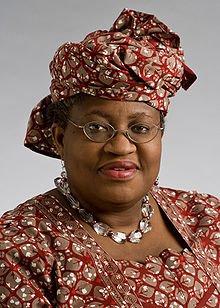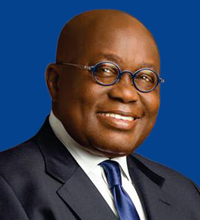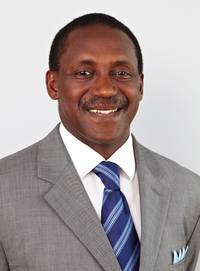Africa and the Challenges of Security, Development, and Governance
Speech Delivered by Dr. Christopher Fomunyoh
Afrikahaus, Berlin, Germany
November 25, 2015

In the past two decades, many African countries transitioned from autocratic or military rule to democratic forms of government, and the continent has witnessed progress in development and governance trends in many areas. Unfortunately, as the continent seemed set to consolidate these gains, growing security threats have emerged that could undermine peace and prosperity, especially if governance structures do not become more effective in meeting citizens’ needs.
Security
Surely Africa has experienced liberation wars, civil wars and other sorts of conflict and violence in the past, but the particularities of insecurity in today’s Africa stem from the changing nature of current security threats and vulnerabilities. Unlike in previous eras, the proliferation of non-state actors is forcing African militaries and security services to engage in asymmetric warfare for which they may not have been prepared. In Sub Saharan Africa, conventional warfare or interstate conflict has been on the decline, whereas intrastate conflicts have been on the rise. Between 2002 and 2005, the number of state based conflicts in Sub Saharan Africa dropped by 60 percent. However, in 2005, more than 50 percent of the world’s intrastate conflicts occurred in Africa, even as that represented a sharp decline in the number of wars since the 1990s.1 Whether in Somalia, South Sudan, North Eastern Nigeria, Darfur, Central African Republic, Northern Mali, or Eastern Congo, insecurity in today’s Africa emerges within national borders, even if in some instances exacerbated by non-state actors moving across what we all know to be very porous national borders. Not too surprisingly, the triggers of insecurity tend to blur the lines, as one frequently finds that behind these acts of violence are a mix of characters with multiple agendas ranging from the mildly political to the criminal and the religious. In most cases, there is a confluence of elements that identify with grievances in all three sectors, hence further complicating the resolution of conflict once it breaks out.
There is a growing and disturbing convergence and connection among networks of organized crime, drug trafficking, illicit activities, money laundering, kidnapping, and terrorism. For example, failing economic development, high youth unemployment, the lack of industries and job opportunities, limited education, and low access to participation in governance provide the breeding ground (or swamps) in which extremist groups thrive. Collectively, as African countries fight these groups, we must also focus on draining the swamps infested with elements that facilitate recruitment of future extremists and hence exacerbate human insecurity.
In the last decade, deep insecurity has been thrust upon African countries by transnational terrorist groups or jihadists that seek to use hitherto ungoverned spaces in some countries, notably in the Sahel and the Horn, as launch pads for attacks against domestic and international targets. As we saw in last Friday’s attack in Bamako, Mali, or with Boko Haram in North Eastern Nigeria (which now calls itself the Islamic State of West Africa), extremist organizations operating in Africa are eager to build alliances with similar organizations in other parts of the world, notably Al Qaeda and the Islamic State of Iraq and Syria (ISIS). In many ways, the terrorism threat in Sub Saharan Africa that has flared up in recent years is fuelled by the global spread of extremist ideologies that exploit social media and its easily accessible information sharing environment. The Sahel region, as well as the Horn of Africa is paying a price for a jihadism that has trickled over from the Middle East, and is now fuelled exponentially by the proliferation of light weapons across the continent, and the aftershocks of the Libyan crisis and the chaotic demise of the Muammar Gaddafi regime. It is common knowledge that AlQaeda in the Islamic Maghreb (AQMI) was launched initially by elements that fought to overthrow the Algerian government in the early 1990s, but in recent years, have consolidated their activities across the Sahel region, particularly in northern Mali. Similarly, Boko Haram with its origins in North Eastern Nigeria is now having a devastating impact on the neighbouring countries of Niger Republic, Chad and my own country Cameroon. In the same manner, the activities of AlShabaab in Somalia are having a destabilizing effect on the security and economic prospects of Kenya and other countries in East Africa and the Horn.
I would like to briefly discuss a few of the most prominent sources of insecurity in Sub Saharan Africa at the moment.
Boko Haram in Nigeria:
According to the Global Terrorism Index report, Boko Haram 2 is the deadliest terrorist group in the world (ahead of ISIS, the Taliban and AlShabab), having murdered close to 7000 people in terrorist attacks in Nigeria, Cameroon, Chad, and Niger Republic. In 2014, 23 percent of all terrorism related deaths worldwide occurred in northern Nigeria. Although we do not have complete figures for how many people Boko Haram has killed in 2015, the terrorist group has dramatically increased its cross border attacks into Chad, Cameroon and Niger, with a spate of suicide bombings earlier this year killing at least 53 people in N’Djamena, the Chadian capital.
AlShabaab in Somalia:
Another Sub Saharan African country, Somalia, continues to struggle to combat Islamic terrorism as AlShabaab seeks to undermine various incarnations of the Somali government since 2009. Despite suffering major setbacks in 2014 and being pushed out of all the major cities of the country, AlShabaab killed more people in terrorist attacks this past year than ever before at least 800 people in more than 400 attacks. AlShabaab has also attempted to strike outside of Somalia, killing people in attacks in Djibouti, Ethiopia, and Kenya.
Northern Mali:
Despite the push back from Malians backed by other African forces and French military that routed out Islamist militant forces (Operation Serval) in 2013, Northern Mali, remains a hotbed for Islamic terrorist activity. As 4 the recent attack on the Hotel Radisson Blu in Bamako last Friday showed, terrorist groups in Mali, notably Ansar Dine and Al Mourabitoun (which has claimed responsibility for the attack)5, have begun to attack “soft targets” such as hotels, cafes, and supermarkets.
Development
In the past two decades, gross national income (GNI) per capita has almost doubled in many countries across Africa. According to the World Bank, the International Monetary Fund and other international financial institutions, many African countries have taken steps to improve the environment for doing business, as a result of which the costs and time required to start a business have declined substantially. Five African countries, Benin, Cote d’Ivoire, DRC, Senegal, and Togo, even rank in the top 10 countries worldwide for enacting reforms that make it easier to do business. Surely, the continent’s abundance of natural resources is driving some economic gains. Africa remains a viable trading partner with a multiplicity of untapped mineral resources. For example, Guinea, with a population of 12 million people, is the world's second largest producer of bauxite and has rich deposits of diamonds and gold. Guinea comes after Australia in bauxite production, but at the same time, maintains the highest bauxite reserves in the world, far ahead of Australia. Ghana and South Africa figure prominently among the top ten gold producing countries in the world. Five African countries Cote d'lvoire, Ghana, Nigeria, Cameroon, and Togo are among the top 10 world producers of cocoa. Five others Ethiopia, Cote d'lvoire, Uganda, Cameroon and Togo are among the top ten world producers of coffee. Gulf of Guinea countries that include Nigeria, Gabon, Congo Brazzaville, Equatorial Guinea and Angola, account for close to 20 percent of oil imports into the United States; and new technology in oil exploration and production is contributing to new oil discoveries in countries such as Mauritania, Chad, Ghana, Cote d'lvoire, Uganda, Kenya, Tanzania, Mozambique, and even Niger. Take a look at the mineral map of the DRC: cobalt, coal, natural gas, nickel, diamonds, gemstones, gold, water resources for hydroelectric purposes, to name a few. Today’s era of globalization has witnessed a boom of new technologies. Financial flows, together with innovation, create markets that foster growth; and one of the biggest growing sectors on the continent is the information and communications technology sector (ICT). Several reports indicate that in 2014, globally, investments in the ICT sector only increased in Africa. Countries such as Kenya,
Ghana, Rwanda, Tanzania, South Africa and Nigeria have made huge investments in ICT infrastructure, working in partnership with international agencies, ICT vendors and researchers. This is no surprise, as Africa is also home to 200 million young people between the ages of 15 and 24, a number that could double by 2045 according to the African Development Bank. This age group is the biggest consumer of technological goods, and as they grow in numbers, so does the demand in this sector. The demographics, if properly managed, are a real asset for Africa. The grievance that many Africans carry, and rightly so, is that these rosy stories of macroeconomic trends and economic potential on the African continent do not translate necessarily into improvements in the wellbeing of ordinary citizens. Too many Africans still live below the poverty line, youth unemployment is extremely high, corruption and economic crimes are high, and investment in the social sectors of health, education, and public welfare are very low. The bottom line is that Africa is not a poor continent. Indeed, it is a rich and wealthy continent both in terms of human capital and natural resources; but it is the poor management of these resources that causes extreme poverty on the continent, and an ever expanding gap between the rich and the poor.
Uneven distribution of economic gains contributes to insecurity as disaffected citizens living in poverty may turn against the government status quo. It is this excessive poverty, not just in economic terms but also in access to political space, freedom, and the civil liberties that most of the world takes for granted, that pushes young Africans to seek greener pastures in other lands, sometimes through the hazards of illegal migration and human trafficking, or that makes young people vulnerable to the recruiter incentives of extremist movements. In this regard, the youth population bulge I described earlier as an asset could become a liability: while having a larger working age population should increase public revenues that can be used to support societal needs, in Africa high levels of unemployment translates into increases in the number of disaffected young people that could be instrumental to movements turned against the state. Speaking at the last conference on migration held in Malta a few weeks ago, the President of Niger Republic Mahamadou Issoufou stated that “over 100,000 illegal migrants from Sub Saharan Africa cross Niger and the Sahara desert every year in search of better livelihoods in Europe.” He listed the causes of such illicit activity as linked to poverty, inequalities, and the deficits of democracy, and then urged Europe and Africa to work together to create conditions for people to feel they could lead decent lives in their home countries.
Governance and Democracy
Political stability that is founded on institution driven effective governance creates an enabling environment for sustainable economic development and eliminating the conditions that serve as breeding grounds for extremism. In authoritarian environments, investors must worry that the rules on commercial transactions and other engagements could always be changed overnight at the whims of one man or of a tiny circle of oligarchs. Invariably, a government with questionable legitimacy is less likely to build the national consensus needed to deliver effective social services to citizens and generate or sustain long term economic growth and development. On the contrary, such a government devotes public resources to sustaining a system of patronage, prebendalism and corruption, without which its stay in power becomes tenuous. The development of strong democratic institutions and good governance practices therefore contributes substantially to growth and development. With the third wave of democratization that began after the collapse of the Berlin Wall and the end of the Cold War, Africa saw the independence of Namibia in 1989/1990, the end of apartheid and release of Nelson Mandela in South Africa in 1991, and the fall of many military and autocratic regimes. In fact, in 1990, Freedom House, which ranks freedoms around the world, rated only four African countries Senegal,
Botswana, Mauritius, and the Gambia as partially free or democratic. Today, Freedom House rates about 11 African countries as totally free and another 19 as partially free, for a total of about 30. Indeed, many African countries have made considerable progress in the past two decades in renewing political leadership, conducting credible and transparent elections, providing space for vibrant political parties and civil society organizations, and creating new institutions that espouse the rule of law, democracy and good governance. For example, the African Union Charter on Democracy, Elections, and Governance (2007), and sub-regional entities such as the Economic Community of West African States (ECOWAS), Inter-Governmental Authority on Development (IGAD) and the Southern African Development Community (SADC) have protocols that promote free trade and allow for free movement of persons and goods, hence promoting more open markets. In today's Africa, unlike two decades ago, civil society is vibrant and seeks to play an advocacy role; human rights organizations exist and regularly denounce the gross violations of human rights by the dozen or so remaining autocratic regimes; and independent media (that includes community based radio stations and print media) provide opportunities for diverse viewpoints and dissenting voices to be heard.
For example, through the first quarter of 2012, Senegal’s democracy was tested by controversy over the candidacy of then incumbent President Wade, viewed by many Senegalese as contrary to the term limits enshrined in the country’s constitution. Thanks in large measure to effective grassroots mobilization by Senegalese civil society, the media, youth movements and political parties, the electoral process was safeguarded and the country experienced a credible transition of power. Similarly, in Burkina Faso in October 2014, when military strongman and long serving Blaise Compaore tried to amend the country’s constitution to extend his 27 years rule, he was chased out of office by a citizen led revolt that was largely peaceful. Not surprisingly, in September this year when remnants of Compaore’s supporters in the presidential guard staged a coup against the transition process, citizens took to the streets and with support from civil society, independent media, and the armed forces of the country, foiled the coup attempt. The Senegal and Burkina Faso examples are significant because they demonstrate that other tenets of democracy are taking root across Africa, and when properly mobilized can serve as a firewall to democratic backsliding.
It is against the backdrop of these significant political changes in Africa that many Africans and friends of the continent lament and condemn the backsliding observed in countries such as Burundi, Congo Brazzaville and Rwanda, where leaders are undermining constitutional rule by manipulating the rule of law to perpetuate themselves in office. By so doing, these leaders shrink or close political space and open the doors to violence and gross violations of human rights as citizens suffocate under their heavy handedness and feel obliged to seek alternativemeans of making their voices heard and their votes count.
Synthesis
In this 21st century, security, development, and governance are deeply intertwined. In today’s very competitive globalizing world, only African countries that are able to tackle all three challenges simultaneously will do well; the nonperformers will invariably face backsliding and rejection. Some countries on the continent are still plagued by issues of corruption, shrinking political space and lack of credible political transitions, and marginalization of its poorest communities. Without effective political leadership and the appropriate delivery of public services to citizens, the prerequisites for development would never be met, and the Millennium Development Goals would remain a distant illusion. To have sustained economic growth, Africa needs inclusive economic institutions and viable political systems capable of creating an enabling environment for private sector investments and exercising proper oversight. In short, today’s debate is not just about having a nation state in name; it is, and should be, more importantly, about how the state is governed. In looking at the way forward, we must recognize that Africa is a fast growing continent in which approximately 40 percent of the population is below 15 years old. In countries such as Mali and Uganda, close to 50 percent of the population is below 15 years old compared to only 20 percent in the USA and approximately 13 percent for Germany. Africa is therefore a youthful continent. There is no doubt in my mind that the youthful population of Africa is an asset to the continent and the world if the continent’s political leaders can create opportunities for these youth to find gainful employment and lead meaningful lives. Africa calls for visionary leadership, and the world has a vested interest in accompanying the continent in this search. Friends of Africa and the continent’s population of approximately one billion people continue to aspire to a better future one in which the three challenges of security, development and good governance are guaranteed. For these aspirations to come to fruition, the continent’s leaders must commit to prioritizing these three areas and conducting themselves as true servants of their people. They must also demonstrate the ability to project Africa on the global stage such that this beautiful continent can make its contribution to the world as part of the global community of our very humanity. Thank you very much for your time and attention.



